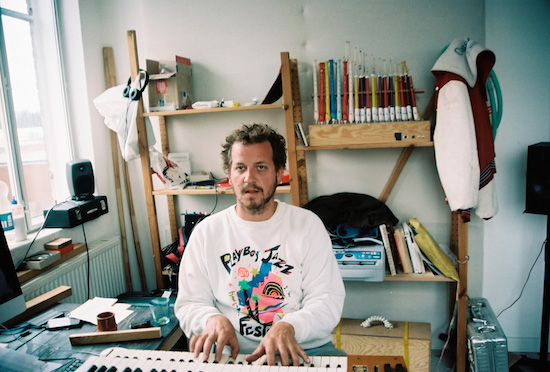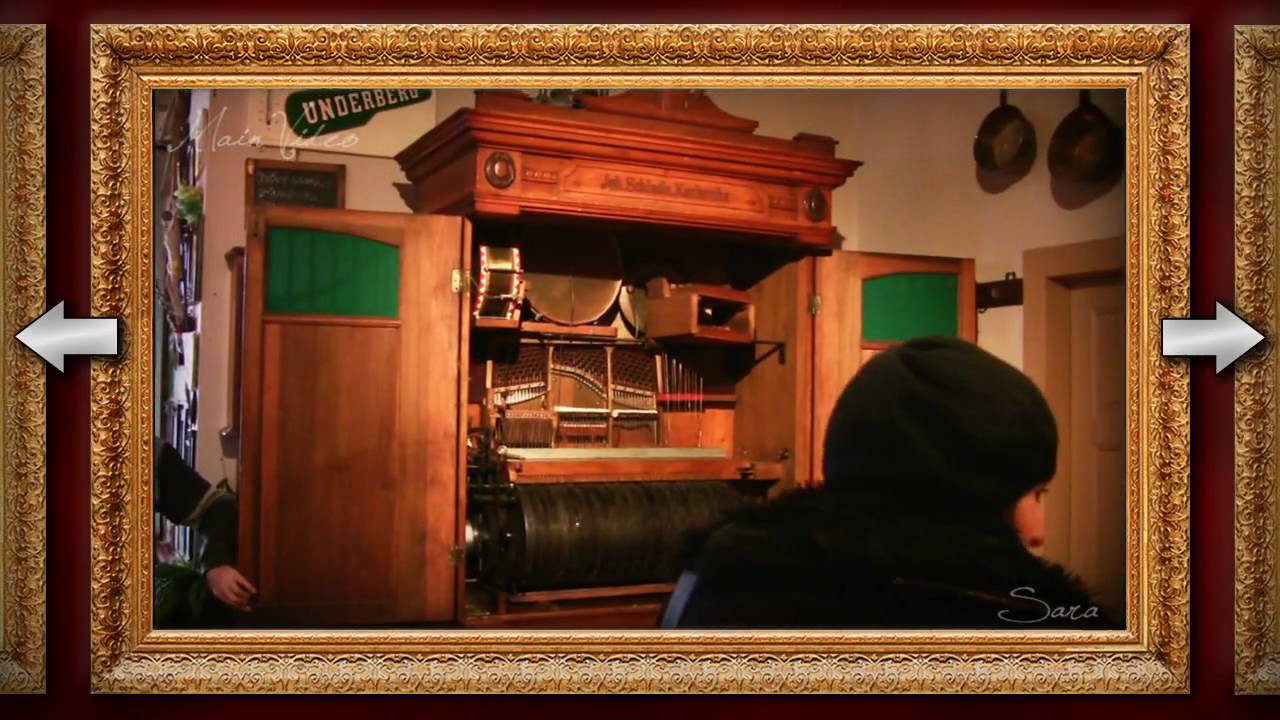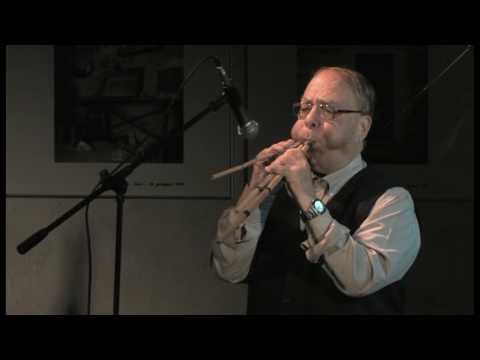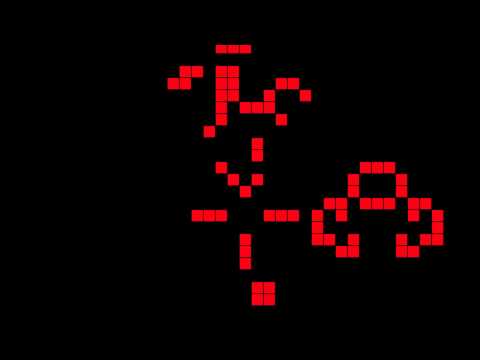"If we really want to revolutionise our present society and elevate it to something higher and more beautiful, I think it can be a good idea to look back and research what there was before we laid down the cornerstones of today."
Frisk Frugt – the experimental pop moniker of Danish artist, Anders Lauge Meldgaard – is increasingly tapping into something pure and prehistorical with his music. The spectrum-widening, eyeball-popping, straight-out-of-leftfield Dansktoppen Møder Burkina Faso I Det Himmelblå Rum Hvor Solen Bor, Suite became one of the Quietus’ favourite albums of 2012, blending faux baroque smatterings of European notes with colourful African beats and instruments, organically intertwining atop hijacked children’s toys and Meldgaard’s own wide-eyed singing, laying down richly strange Danish poetry. It’s an all-encompassing sort of composition, tapping directly into strange, curious, human methodologies that predate those ‘cornerstones’ of today. Seriously though, why not jam noisy guitar squalls over a homemade slide whistle organ paired with a string quartet? The latest Frisk Frugt album, Den Europæiske spejlbue ("The European Arch Mirror") sees Meldgaard enter almost chokingly beautiful pastoral territory, nonetheless maintaining his pocket toy orchestra, and a growing array of homemade and self-modified mechanical instruments in tandem with folksy guitars and a host of guest orchestral instrumentalists and assembled choirs.
As implied by the shift in geographic focus in the title (‘Europe’ rather than ‘Burkina Faso’), Den Europæiske spejlbue stems almost directly from Meldgaard’s archival research into Danish folk music – precisely where the Quietus last left him back in our 2012 interview with the artist – as well as excursions around Germany and the unique musical landscape of Sardinia. While Dansktoppen was pointedly a ‘collage of sound’, Den Europæiske spejlbue comes across as a more focused affair, knowingly repeating musical themes and phrases dizzyingly across sixty packed minutes, with songs often embodying those titular symmetrical chiastic structures – as symmetrical and reflective as an arch mirror. Meldgaard made it clear, "it was obvious and important to try and explore some more domestic ideas and European ideas to make a new statement of everything being exotic". His mission has been wholeheartedly accomplished, cramming every inch of possible music into every available inch. ‘Exotic’ hardly covers how wildly alien, yet totally inviting this music is. After forty five stunning minutes of kaleidoscopically reprogrammed European folk forms, we are met with the destructive and redemptive genius of ‘Omdrejningsmusik Solens Mekanik’ (‘Revolution Music Mechanics of the Sun’), a sixteen-minute instrumental which incorporates something of all that’s come before into a slowly rising and falling epic that ranges from tentative orchestral dissonance all the way up to the apocalyptic noise rock free-forms of Skullflower. Like the rest of the album, it’s a stunning statement, condensing the disparate cultures of an entire continent into a powerful blast of frenetic music, which somehow remains nonetheless filled with hooks, and even has enough space left over to whack out a few notes on gadgets only found in Toys "R" Us.
Though based in Copenhagen and Berlin, Meldgaard remains busy as ever, travelling constantly, and will in fact visit the UK this March. Anybody within even vaguely sensible distance of Sheffield, London and Bristol is implored to attend. Speaking during a recent excursion to present his music in the Faroe Islands, I spoke to Frisk Frugt about helium-3, playing with slide whistles, and searching for the "Danish beat".
When the Quietus last left you back in our 2012 interview, you said that you’d "been sitting in an archive in Copenhagen for a month doing some research on folk music. So, I kind of have a feeling that the next album might be a little more domestic". This seems to have come true! What did you discover in the archive, and how does the research show on this album?
Anders Lauge Meldgaard: Well, originally I went to the archive to look for a "Danish beat". I was looking for old recordings of Danish folk music with drums on to see and hear if there should be a kind of special way the drums are handled. I was looking for this, because I once heard a concert with a very great sound artist named Hassan Khan from Cairo. During his concert it struck me how clearly his music came from Egypt because of the sound and swing of the beat… that led me to think, how does a Danish beat sound? Turned out that there is not very many recordings of Danish folk music with drums, so it was a little bit of a dead end. But one thing I found out is that the drums often play along on the melody on these folk recordings. This is a thing I have been thinking about while making Den Europæiske spejlbue, not to have a beat but to have the drums and percussion parts support the melodies in a way that is not locked into a strict beat.
Your last album was heavily influenced by a trip to Burkina Faso and Mali. Where have you been since then, and have any travels influenced the making of Den Europæiske spejlbue?
AL: I have been in the Danish folk music archive as mentioned before and on a bicycle trip in the south of Germany where I visited two different mechanical music instrument museums. One in Rudesheim and one in Bruchsal. In those places I was looking at old mechanical music instruments – in a way the very first electronic instruments. This is inspiring to me because I am very interested in the tension between programmed music and music played by humans and both of these things are very present on the new Frisk Frugt album. I was also tasting some beautiful white wine, highly recommended!
I also went to Sardinia to listen to music made with launeddas. It is a fantastic polyphonic woodwind instrument, that is only found on this island. I met the one of the present masters on the instrument, Luigi Lai. He plays a very complex, very very great type of European folk music. I am inspired by the way the melodies can fly around freely and yet intertwined in each other. I went to see him play on the top of a mountain, going there with my girlfriend and a local guy who played Shaggy extremely loud from his car stereo… great trip…
What is "the European Arch Mirror"? To what are you referring?
AL: If you look up the music term, an arch form, you will find out that it is a musical form that goes like ABCDEDCBA. Out and then back again. This is the overall structure on Den Europæiske spejlbue but actually I should not be telling you this, because it is these kind of things that are up to the listener themselves to discover. But, anyways, it also refers to that reflection – the opposite of doing a record inspired be an exotic and foreign place like Mali or Burkina Faso. So in many ways I am thinking about this new album as a counter reaction to Dansktoppen møder Burkina Faso….. from 2010. For me it was obvious and important to try and explore some more domestic ideas and European ideas to make a new statement of everything being exotic.
What went into choosing the instrumentation for this new album? Were there any difficulties in notating for other instrumentalists? How much of a collaboration was it?
AL: Everything is composed by me, so in that way it was not so much of a collaboration. I would say it was a lot of work, but also fun. It can be very satisfying to hear some of your parts played by real instruments after listening to artificial versions of it for a while. Often I was recording some parts of a song with real musicians, and then taking it back to work more on it on my own. There has been an extensive experimentation with the arrangements of the songs on the album. A method I have used a lot is to totally break down a song to only have lyrics and a melody, and experiment on how to put music to that. On choosing the instruments it was a goal for me all the way through to have a combination of real instruments and artificial ones, like synthesisers, etc. I also wanted the real instruments to have a flavour of "classical Europe", eg. violins, flute, tuba, etc., and try to combine them with computer worked elements.
You’re still making your own instruments I presume? What sort of new ones did you use on this album?
AL: I used a toy flute organ that I have built. It is controlled via MIDI and is made out of plastic recorders and slide whistles.
Also I used a software that I have made in collaboration with my brother, Kristian Lauge Meldgaard. We call it cellular sounds. It is based on the mathematical system called Game of Life by John Conway.
Also I used a MIDI controlled cembalo that I also built myself. It is used as a prepared cembalo on the album.
How did you build the toy flute organ? Are they arranged in a scale that corresponds with western classical music? It definitely seems like an instrument very directly influenced by some of what you saw at the German museums…
AL: Originally I wanted to build a portable pipe organ version of a prepared piano. My idea was to use all different flutes to achieve that. I found out that in order to do that you would need a different air pressure for each flute, which is not very easy to do. So instead I ended up building an organ using two different flutes – the recorder flutes and the slide whistles. What’s great about the slide whistles is that you can tune them to a big variety of notes. The organ can be tuned so that it more or less corresponds to the classical western-tempered tuning, or it can be tuned totally free. I tend to do the second of these two versions the most, as that enhances the unique tone quality of the flutes themselves.
You mention the sun a lot throughout the album.
AL: Yes, there is some talking about the sun. Well, my idea, when working on the lyrics for the album, was that I wanted to go back in time. Because of the fact that the whole of our European society is built upon Christian ideas I wanted to try and go back before the beginning of Christianity. The idea is that if we really want to revolutionise our present society and elevate it to something higher and more beautiful, I think it can be a good idea to look back and research in what was before we laid down the cornerstones of today. It is an attempt to bypass all Christian values and open everything to new thoughts and ideas… That is why you find a lot of nature and sun in the lyrics…
Do you think machines, automation and computers are useful tools for bypassing Christian values? They are modern, and stem largely from when post-religious society made its way into all corners of Europe.
AL: My idea with the lyrics was to go back the other way, meaning back to what was before Christianity, in order to find elements that can change the present. The idea of using computers and machines is more one about using musical material that is programmed in order to contrast the elements that are played by hand.
The grand finale – ‘Omdrejningsmusik solens mekanik’ – is completely stunning. The noisy sounds and drums and guitar playing on it are incredible. Could you tell me a bit about what this track is about?
AL: Actually this track is composed over the idea of a summer’s day passing. In the beginning you hear the fragile single morning beams of sunlight, and as the day progresses the heat from the sun gets more and more intense. The most noisy part in the middle is after midday and afternoon where the heat is most intense and lets you get into a more cooling of sundown where you see the light from the sun through the leaves of trees just like you do in the very beginning of the whole album and in that one the circle is made. A tone poem like in the good olden days if you please.
Do you still live and work in Berlin? Where are you based and what’s going on right now?
AL: I am based in Copenhagen and Berlin. Right now I am building a new organ and recording some new synthesiser music. I am working on music for four analog monophonic synthesisers that will be performed later this year. And the idea with these new compositions is that they can be transferred to a classical chamber ensemble. Because later in the year I have been invited to compose for a group called Storstrøms Kammerensemble, a Danish classical chamber ensemble. And I want to connect the music for synthesisers with music for this chamber ensemble. Also I am thinking about writing a Frisk Frugt musical about helium-3, and all the amazing possibilities that offers people on Earth right now but that is a whole other story.
What is helium-3? Do you think humanity itself hinders progress, or helps it? Systems, and in particular religion and still-existing systems that resemble religions, often seem to stop good from happening.
AL: True that. Helium-3 is a substance that there is a lot of on the moon and none of here on Earth and it can be used in a very effective way to make fusion power. So I think that we have a great chance here to do something great with. I don’t want to get too deep into this, but there is lots of information about helium-3 and lectures on the subject around on the internet. Look it up!
What is Postcard From The Composer’s Workshop? (I spotted this.)
AL: It is a postcard with 40 minutes of music on a microchip. All the recordings on there were made doing the work with Den Europæiske spejlbue. So it is different early version and sketches and leftover material for that process. It is complete self-contained with a small speaker and batteries, ready to bring to the forest or on a picnic with your special boy or girl.
Den Europæiske Spejlbue is out now on Tambourhinoceros. Frisk Frugt will embark on a European tour in March and April 2015. Find the latest information at qujunktions.com





